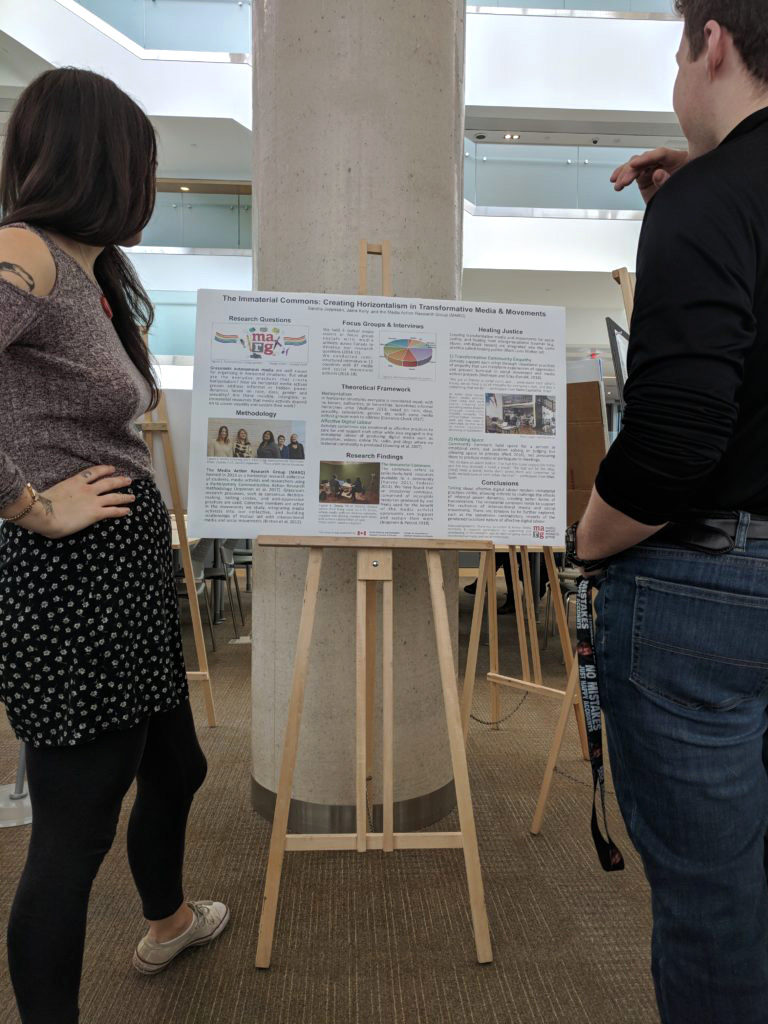From March 4-6 2019, Lakehead Orillia participated in Research and Innovation Week. It’s part of the bigger Lakehead R&I Week hosted the week before on the main campus in Thunder Bay. This week of celebrating research always kicks off with a ceremony, where community leaders and University faculty convene to offer their remarks on the importance of education and research. In Orillia, Mayor Steve Clark made an appearance, as well as special guests The Orillia Native Women’s Group who were honoured during the ceremony; they were attending to showcase the first day of an incredible display of their group’s mixed media artwork.

The opening ceremony is followed by lunch and an opportunity to browse the many academic posters and presentations located around the Universities. For Orillia, the posters were based in the Learning Commons, where you could find a captivating variety of research topics, anywhere from children’s behaviour and education to breakdowns of very specific scientific discoveries.
R&I week is all about celebrating the research achievements of faculty, staff and students, so naturally MARG members Jaina and Cassidy attended the Orillia event to present the findings of MARG’s newest research paper, titled: “Sustaining Horizontalism: Affective Digital Labour in the Immaterial Commons”, and explores the impact of what we identify as the “Immaterial Commons”, or a shared set of skills relating to community empathy, holding space, caring for one another and recognizing mental well-being as an essential requirement for success in digital media activism and broader social movements. The paper is in the editing phase and will be published in a book called “Organizing Equality”.
Why is it that we dedicate a whole week to sharing our research with our communities? In a piece for The Conversation, Science Communication researcher Marina Joubert analyses the importance of sharing research with a broader public audience. She consults Matt Shipman, who offers peer-reviewed evidence to show that public communication: “helps scientists to attract top students, impress their funders, network with other researchers, form new collaborations and draw interest from industry and government” (2016).

MARG member Cassidy who played an essential role in our research 
Jaina sharing our findings with Dan!
The more that a community understands the work being done, the more support is available, and this public communication effort certainly includes engaging on social media. Dominique Brossard, a University of Wisconsin-Madison professor of life sciences communication, weighed in on the power of social media to increase citations: “Instead of thinking of time spent on social media as a distraction, researchers should see it as a way of making their work more accessible to broad audiences.”
In this way, MARG is perhaps ahead of the curve, but we have good reason—our focus is directly in the field of media production and furthermore, we employ a Participatory Communicative Action Methodology. Therefore, we are already active within networks that use communication as a method of social action. Additionally, MARG has continually worked to develop and share media outside of academic circles, linking texts and video to our website; supporting media projects and facilitating workshops on media activism.
References
Joubert, M. (2016, August 23). Scientists have much to gain by sharing their research with the public. Retrieved February 28, 2019, from https://theconversation.com/scientists-have-much-to-gain-by-sharing-their-research-with-the-public-64129


